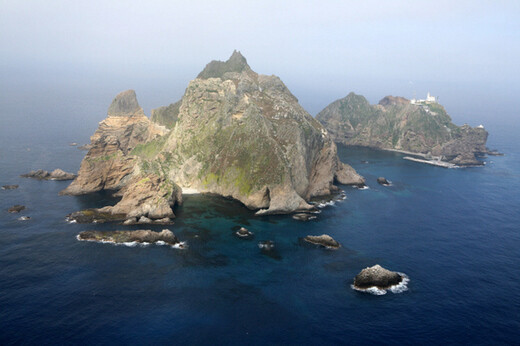hankyoreh
Links to other country sites 다른 나라 사이트 링크
Gov’t to include Dokdo issue on Korea-U.S. summit agenda

After the U.S. Board on Geographic Names changed the way it classifies Dokdo, from its listing as Korean territory to “undesignated sovereignty,” attention has turned to the ROK-U.S. summit between President Lee Myung-bak and his U.S. counterpart George W. Bush, slated for August 6 as a diplomatic dispute could arise.
When the government became aware of the change on July 27, the Blue House seemed to be acting prudently, saying that the matter would not be included on the agenda. But on July 29, the Korean government’s position was that the issue should be discussed at the summit. Regarding this, a Blue House official said that there could be diplomatic repercussions if President Lee were to mention the issue officially, but the summit agenda would be decided based on public opinion on the issue.
Another official remarked that the president will mention the matter.
An official of the Ministry of Foreign Affairs and Trade agreed, saying there is no reason why it cannot be mentioned.
The problem is how the issue can be raised. In connection with this, a government official said, “It is difficult to say a week ahead of the summit. The level of discussion could change depending on how the situation develops before the summit.”
There are two potential approaches to how the issue can be raised. President Lee could take an indirect approach and attempt to seek Bush’s understanding of the South Korean perspective by explaining the history of Northeast Asia and
the special relationship between South Korea and Japan with regard to Dokdo.
Lee could also take a more direct approach by expressing regret about the BGN’s decision and requesting that Bush change the Dokdo listing. On July 29, Prime Minister Han Seung-soo criticized the U.S. agency for its decision, saying that it was not based on historical fact. This method could be advantageous to allowing Korea to get its message across clearly.
However, President Bush is not likely to accept Lee’s request. “The U.S. position has been not to take a position regarding the sovereignty of the islands in question,” U.S. State Department deputy spokesman, Gonzalo Gallegos, had said in a briefing on the previous day. The two nations should resolve the problem peacefully, Gallegos added.
It seems that the government does not want to mention the matter directly because of the possibility of initiating a diplomatic dispute between Seoul and Washington.
However, another problem is that there could be an increase in anti-U.S. sentiment if the summit talks do not produce a favorable result for Korea. For this reason, a key Blue House official said, “President Lee should raise the issue to prevent such a situation.”
Please direct questions or comments to [englishhani@hani.co.kr]
Editorial・opinion
![[Editorial] Does Yoon think the Korean public is wrong? [Editorial] Does Yoon think the Korean public is wrong?](https://flexible.img.hani.co.kr/flexible/normal/500/300/imgdb/original/2024/0417/8517133419684774.jpg) [Editorial] Does Yoon think the Korean public is wrong?
[Editorial] Does Yoon think the Korean public is wrong?![[Editorial] As it bolsters its alliance with US, Japan must be accountable for past [Editorial] As it bolsters its alliance with US, Japan must be accountable for past](https://flexible.img.hani.co.kr/flexible/normal/500/300/imgdb/original/2024/0417/6817133413968321.jpg) [Editorial] As it bolsters its alliance with US, Japan must be accountable for past
[Editorial] As it bolsters its alliance with US, Japan must be accountable for past- [Guest essay] Amending the Constitution is Yoon’s key to leaving office in public’s good graces
- [Editorial] 10 years on, lessons of Sewol tragedy must never be forgotten
- [Column] A death blow to Korea’s prosecutor politics
- [Correspondent’s column] The US and the end of Japanese pacifism
- [Guest essay] How Korea turned its trainee doctors into monsters
- [Guest essay] As someone who helped forge Seoul-Moscow ties, their status today troubles me
- [Editorial] Koreans sent a loud and clear message to Yoon
- [Column] In Korea’s midterm elections, it’s time for accountability
Most viewed articles
- 1‘Right direction’: After judgment day from voters, Yoon shrugs off calls for change
- 2[Editorial] Does Yoon think the Korean public is wrong?
- 3[Editorial] As it bolsters its alliance with US, Japan must be accountable for past
- 4Where Sewol sank 10 years ago, a sea of tears as parents mourn lost children
- 5Strong dollar isn’t all that’s pushing won exchange rate into to 1,400 range
- 6[Guest essay] Amending the Constitution is Yoon’s key to leaving office in public’s good graces
- 7Japan officially says compensation of Korean forced laborers isn’t its responsibility
- 8[News analysis] Watershed augmentation of US-Japan alliance to put Korea’s diplomacy to the test
- 9In 50 years, half of Koreans are expected to be 65 or older
- 10[Column] Brazil, Egypt and Korea